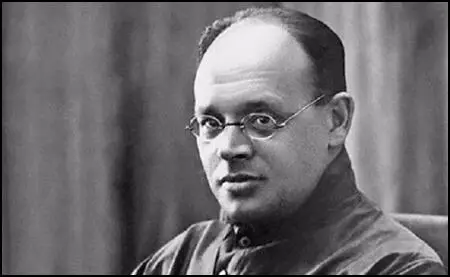Isaac Babel
Isaac Babel, the son of a Jewish shopkeeper, was born in Odessa, Ukraine, on 13th July,1894. When he was a child he witnessed a pogrom and was deeply influenced by the experience.
After leaving school Babel moved to Kiev. He began writing but had no success with his work until he met Maxim Gorky in 1916. Soon afterwards Gorky printed two of his short stories in his Letopis. The Russian censors considered the stories to be obscene and Babel was charged under Article 1001 of the criminal code.
Babel joined the Bolsheviks in 1917 and during the Civil War he served as a political commissar in the Red Army. A collection of his stories based on his war experiences, Red Cavalry was published in 1926. The following year he published Odessa Tales, a collection of stories about Jewish life in Russia. He also wrote two plays, Zakat (1928) and Mariya (1935).
Babel became increasingly critical of the rule of Joseph Stalin and found it increasingly difficult to get his work published. At the first meeting of the Soviet Writers' Union in 1934, Babel told the gathering that: "I have invented a new genre - the genre of silence".

In May, 1939, Babel was arrested and his work was confiscated. According to the Soviet government Isaac Babel died in a prison camp in Siberia on 17th March, 1941. However, his family believe he was executed soon after he was arrested in 1939.
Primary Sources
(1) Issac Babel wrote a brief autobiography that was published by his daughter, Nathalie Babel in 1964.
In 1915 I began to take my writing around to editorial offices, but I was always thrown out. Then at the end of 1916 I happened to meet Gorky. I owe everything to this meeting, and to this day I speak his name with love and reverence. He published my first stories in the November, 1916, issue of Letopis. For these stories I was charged under Article 1001 of the criminal code.
(2) Nathalie Babel, Isaac Babel (1964)
It was in 1923 during his stay in the mountains that my father began to work on the stories which eventually appeared in Red cavalry. Achieving the form that he wanted was an endless torture. He would read my mother version after version; thirty years later she still knew the stories by heart. My parents moved to Moscow in 1924. My father's first stories were being published at the time, and he became famous almost overnight.
(3) When Osip Mandelstam was being investigated by the Secret Police he went to see the short-story writer, Isaac Babel, a leading figure in the Union of Soviet Writers. The meeting was later recorded by Mandelstam's wife, Nadezhda Khazina.
The next person we consulted was Babel. We told him our troubles, and during the whole of our long conversation he listened with remarkable intentness. Everything about Babel gave an impression of all-consuming curiosity - the way he held his head, his mouth and chin, and particularly his eyes. It is not often that one sees such undisguised curiously in the eyes of a grown-up. I had the feeling that Babel's main driving force was the unbridled curiously with which he scrutinized life and people.
With his usual ability to size things up, he was quick to decide on the best course for us. "Go out to Kalinin," he said, "Nikolai Erdman is there - his old woman just love him." This was Babel's cryptic way of saying that all Erdman's female admirers would never have allowed him to settle in a bad place. He also thought we might be able to get some help from them - in finding a room there, for instance. Babel volunteered to get the money for our fare the next day.

